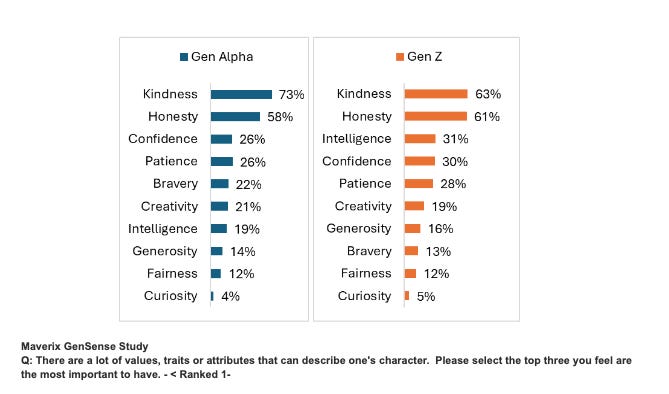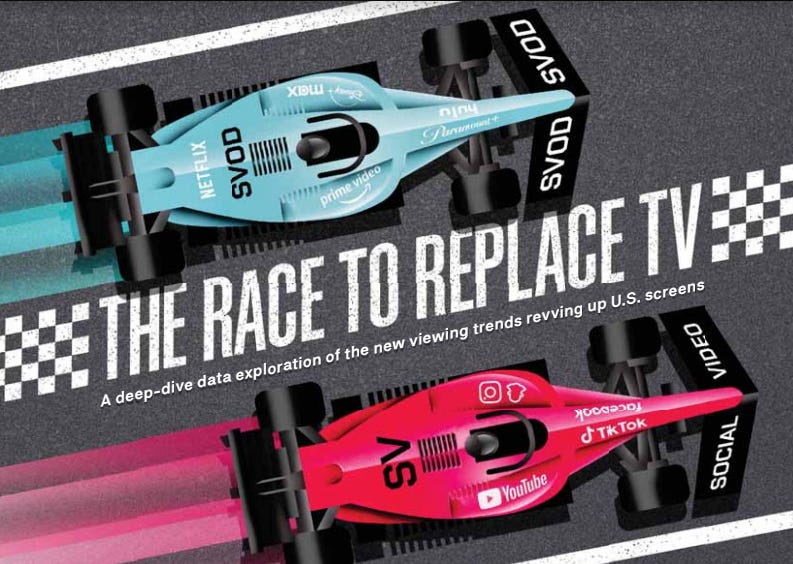Gen Z and Gen Alpha: The Social Media-Mental Health Connection
Why it’s essential for media companies to connect authentically with digital natives.
Welcome to Hub Intel. We’re here to provide data, not drama. Our goal is to help you understand the trends in the entertainment industry and what they mean to your business.
Gen Z and Gen Alpha: The Social Media-Mental Health Connection
In our screen-saturated era, social media isn't just part of life for Gen Z and Gen Alpha; it is life. These digital natives are glued to their devices more than ever. According to Maverix Insights’ Media Identity Graph, Gen Z’s share of social media video watch time has jumped by 12% compared to 2023 and a whopping 22% since 2022. If you’re not tailoring your strategies to their scrolling patterns, you’re missing out—big time.
% of Screen Time Dedicated to Social Media Videos
Understanding these generational usage patterns isn't just a nice-to-have; it's a must-have. It’s about digging deeper, getting real with digital natives’ needs, and acknowledging the flip side: the mental health impacts. Prolonged screen time can lead to anxiety, depression, and body image issues. It’s a double-edged sword.
The Social Media-Mental Health Connection
Maverix Insights’ GENSense report found that nearly 60% of 18-26-year-olds and one-third of 10-17-year-olds feel social media negatively impacts their mental health. Yet, despite the risks of anxiety, depression, and sleepless nights, they stick with it. Why? Because social media isn’t just a platform—it’s their playground, their hangout spot, their stage.
Mitch Prinstein, PhD, chief science officer at American Psychological Association, summed it up when he said, “Social media isn’t going away. We need to focus on how we can help young people navigate social media in healthy ways.”
Applying that sentiment to the entertainment industry, media companies that do the work to deeply understand both the needs and concerns of social media users will have the strongest opportunity to find success among these generations.
The Antidote to Unrealistic Expectations
Let’s talk entertainment and its love affair with unrealistic standards. The same GENSense study also found that a staggering 80% of parents are worried about the impact of social media on their kids, and it’s not hard to see why. Influencers and celebrities flaunting flawless lives on Instagram and TikTok set the bar sky-high, leading to body dissatisfaction and low self-esteem. Shows like “Keeping Up with the Kardashians”, “Real Housewives”, and “Emily in Paris” don’t help either, painting a picture of a life that's just out of reach for most.
The antidote to this is embracing authenticity and honesty. Brands need to connect with digital natives through authentic marketing and content. Also according to GENSense, young people prioritize authenticity over perfection. They can sniff out insincerity a mile away. So, it’s time to stop “box-checking” and make real changes.
On the bright side, some celebs and brands are getting it right. Selena Gomez, Simone Biles, and Dwayne "The Rock" Johnson openly discuss their mental health struggles, breaking the stigma and encouraging their fans to seek help. Brands like Nike, Dove, and Target are leading the charge with campaigns that celebrate body positivity and authenticity. By taking these steps to be authentic and honest, brands can build deeper, more meaningful connections with hyper-aware Gen Zs and Gen Alphas, fostering a loyal audience that feels seen.
Gaming: A Golden Opportunity
Gaming is a massive part of life for Gen Z and Gen Alpha. Major players and newcomers like Netflix have a golden opportunity to counteract the negative effects of screen time. Games can create communities, offering support and reducing feelings of isolation and anxiety. Platforms like Discord, Twitch, and YouTube are crucial in fostering these positive spaces.
This is especially important for young women since gaming culture has a reputation for sexism and misogyny. Creating inclusive, supportive environments in gaming is vital to building trust with these young players.
The Big Picture
Social media’s impact on mental health isn’t black and white. It’s about seizing opportunities to spread positivity, create healthy spaces, and showcase genuine role models. Consumers often make choices based on brand values and brand trust. Knowing media and entertainment companies are working to create environments in which their mental health is at the forefront of decision making will drive continued loyalty among these younger audiences. Media and entertainment companies can use this knowledge to connect authentically with Gen Alpha and Gen Z, building a supportive and mentally healthy digital world together.
Reach out to Maverix Insights & Strategy for the complete GENSense; an immersive study that dives into the world of Gen Alpha, Gen Z and their families.
Liz Huszarik is a Global Insights leader with 25+ years’ experience. Previously the Chief Research, Insights & Data Science Officer for Warner Bros. Discovery, she oversaw and advanced the company’s Global Insights, Data Science & Analytics practice – a cross-disciplined group of 120+ researchers, analysts, and data scientists. As co-founder of Maverix Insights, she is spearheading the future of cross platform measurement with the recent launch of Maverix Media Identity Graph (MIDG). With zero-party data from 30 million U.S. consumers, MIDG captures every touchpoint in the consumer digital journey, offering real-time data and insights across streaming, social video, gaming, FAST Channels, virtual MVPDs, Music, Betting, and more.
Alexia Raven is the Co-Founder of Maverix Insights, Strategy & Design, and a seasoned Insights professional and Moderator. She excels at uncovering the emotions and motivations behind people's attitudes, beliefs, and behaviors to drive business innovation. Previously, Alexia was Vice President of Warner Bros. Discovery Global Research & Insights/Fanlab group, where she led qualitative services to develop content, products, services, and marketing strategies across all brands and franchises. Prior to Warner Bros., Alexia held positions at FOX Broadcasting and Lin Television, where she honed her expertise in understanding audience dynamics and shaping successful media strategies.
ICYMI: Hub in the News
The Race to Replace TV: Full Report
Variety VIP+: The Race to Replace TV: A deep-dive data exploration of the new viewing trends revving up U.S. screens
Want More Hub Intel?
Hub Intel is a reader-supported publication. Become a paid subscriber to get access to exclusive Hub white papers and deep dives on key topics as well as admission to Hub’s webinars.
About Hub Entertainment Research
Hub Entertainment Research, which celebrated its 10th anniversary in 2023, tracks how technology is changing the way people find, choose, and consume entertainment content: from TV and movies to gaming, music, podcasts, and social video. Hub’s studies have covered the most important trends in providers, devices, and technologies since 2013. We work with the largest TV networks, pay TV operators, streaming providers, technology companies, and studios to assess the present and forecast the future.
Learn More: Visit our website
Follow Us: LinkedIn
Get In Touch: Email us at hubintel@substack.com











